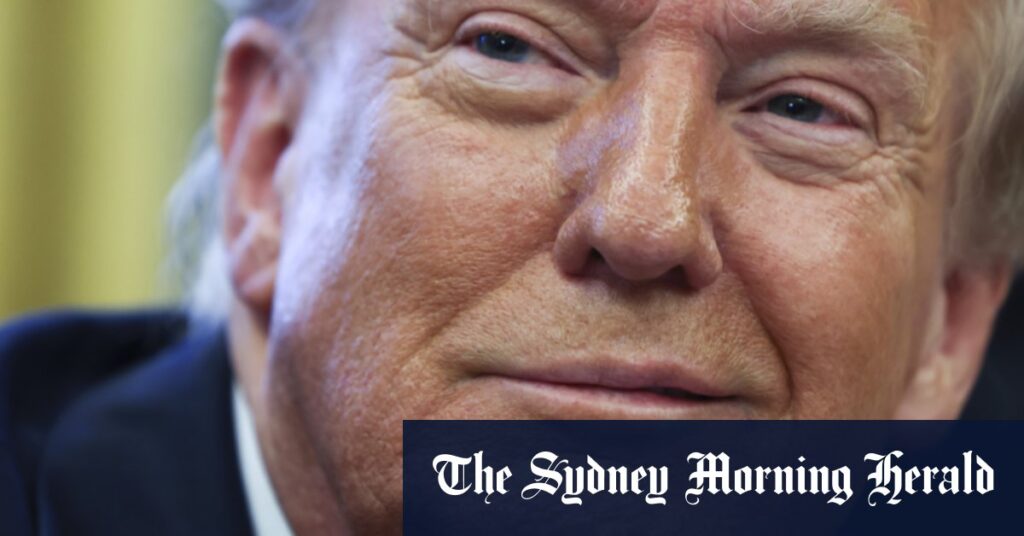Trump also said there needed to be some form of peacekeeping troops in Ukraine if an agreement to end the conflict was struck. Moscow has refused to accept any deployment of NATO troops.

Cemetery workers in Poltava, Ukraine, lower a coffin after the funerals of a family killed by a Russian airstrike on February 1.Credit: AP
Trump’s rush to impose an end to Russia’s war in Ukraine has stoked fears of far-reaching US concessions to Russian President Vladimir Putin that could undermine security in Ukraine and Europe and alter the geopolitical landscape.
It was not immediately clear whether the agreement carries any specific US security guarantees that Ukraine had sought or if Washington has committed to sending additional military aid.
One of the sources familiar with the deal said future weapons shipments are still being discussed between Washington and Kyiv.
Russian President Vladimir Putin on Monday said US companies could help mine rare earths in Russian-occupied parts of Ukraine.
Putin, in an interview on Russian state television reported by The New York Times, said Russia had an “order of magnitude” more rare earth metals than Ukraine, and that Moscow was “ready to work with our foreign partners, including the Americans” to develope those deposits.
Trump last week called Zelensky an unpopular “dictator” who needed to cut a quick peace deal or lose his country, while the Ukrainian leader said the US president was living in a “disinformation bubble”.
Earlier, dozens of countries rallied behind Ukraine at a meeting at the United Nations in Geneva on Tuesday (Swiss time), a day after the UN Security Council adopted a US-drafted resolution that takes a neutral stance on the conflict, as the UK pledged to increase defence spending.
The UN event, held to commemorate “resistance to the Russian aggression”, follows the resolution adopted in New York on the war’s third anniversary that reflects President Donald Trump’s upending of US policy on Ukraine and his more conciliatory stance towards Russia.

Ukraine’s ambassador Yevheniia Filipenko speaks at the opening of the 49th session of the UN Human Rights Council in Geneva, Switzerland.Credit: AP
“You are not alone. Norway and other countries, all the countries who are here, but also other countries, will continue to support you as you fight for your territorial integrity, your sovereignty and your human dignity,” Norway’s Deputy Foreign Minister Andreas Motzfeldt Kravik told a packed room of ministers and diplomats.
Most countries attending the Geneva event were European and included France and Germany, but others such as Turkey, South Korea, Australia and Japan were also present. Washington sent a delegate who did not take the floor.
Ukraine’s ambassador Yevheniia Filipenko, who at one point became emotional while addressing the room, asked countries to continue their support for rebuilding Ukraine and seeking accountability for crimes committed since Russia’s invasion.

British Prime Minister Keir Starmer in Kyiv on January 16.Credit: Getty Images
“The road ahead is very challenging but when we are united we can prevail,” she said.
British Prime Minister Keir Starmer said on Tuesday he would increase annual defence spending to 2.5 per cent of gross domestic product by 2027 and target a 3 per cent level last seen just after the Cold War, a signal to US President Donald Trump that Britain can boost Europe’s security.
On the eve of his departure to meet Trump in Washington, Starmer told parliament he was bringing the increase in defence spending forward to offer Europe more support as the US spearheads peace talks with Russia over its war in Ukraine.
With public spending already stretched in Britain, Starmer said the increase from its current 2.3 per cent would be fully paid for by a 40 per cent cut to international aid, an announcement he said he was not happy to make but one which was necessary to offer Ukraine and Europe support in a “new era”.
with Reuters

